Managing Mosquitoes Throughout All Life Stages
As is generally known there are four life stages in the development of a mosquito: egg, larva, pupa, and adult. Perhaps less known is that each stage has a corresponding and unique method of attack, or as we shall see, a lack of one when it comes to targeting mosquito management efforts at each stage of the mosquito’s life cycle.
Life Cycle Stage 1: Egg
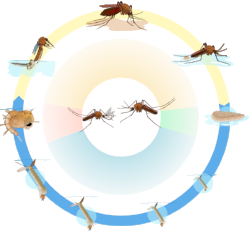 Although several studies have shown the efficacy of several plant-derived botanical oils as an ovicide (an insecticide designed to kill eggs) these studies were conducted in the lab under a carefully controlled environment, very much unlike the conditions found out in the field where mosquitoes eggs are extremely difficult if not outright impossible to identify in the numbers needed to make a meaningful impact. While oviciding could be viewed as an ideal control method, in theory, oviciding remains perpetually unproven in the real world. Because the method remains unproven, mosquito management professionals often consider the next stage of development the best option in mosquito control efforts.
Although several studies have shown the efficacy of several plant-derived botanical oils as an ovicide (an insecticide designed to kill eggs) these studies were conducted in the lab under a carefully controlled environment, very much unlike the conditions found out in the field where mosquitoes eggs are extremely difficult if not outright impossible to identify in the numbers needed to make a meaningful impact. While oviciding could be viewed as an ideal control method, in theory, oviciding remains perpetually unproven in the real world. Because the method remains unproven, mosquito management professionals often consider the next stage of development the best option in mosquito control efforts.
Life Cycle Stage 2: Larva
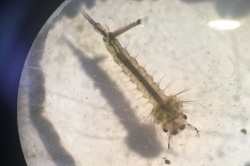 Larval mosquito control forms the backbone of most Integrated Mosquito Management (IMM) programs throughout the country and for a good reason. There is no single more effective method of preventing the emergence of adult mosquitoes than a comprehensive approach in which larval habitats such as ponds, marshes, swamps, fields, ditches, etc., are regularly inspected and when necessary treated with a larvicide. The use of a larvicide designed primarily to impact mosquito larvae thereby reduces the risks to non-target organisms. Depending on the size and layout of the larval area larvicide applications can take place on land or in the air. Successful implantation demonstrably reduces though not totally eliminates the number of adult mosquitoes in a given control area, minimizing the need for more intensive and controversial adult control actions.
Larval mosquito control forms the backbone of most Integrated Mosquito Management (IMM) programs throughout the country and for a good reason. There is no single more effective method of preventing the emergence of adult mosquitoes than a comprehensive approach in which larval habitats such as ponds, marshes, swamps, fields, ditches, etc., are regularly inspected and when necessary treated with a larvicide. The use of a larvicide designed primarily to impact mosquito larvae thereby reduces the risks to non-target organisms. Depending on the size and layout of the larval area larvicide applications can take place on land or in the air. Successful implantation demonstrably reduces though not totally eliminates the number of adult mosquitoes in a given control area, minimizing the need for more intensive and controversial adult control actions.
Life Cycle Stage 3: Pupa
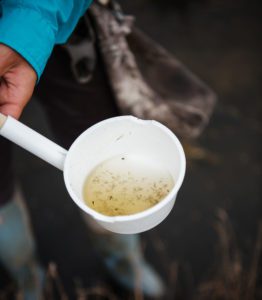 Mosquitoes in their third stage of development, the pupal, no longer biologically resemble their previous stage and in key ways no longer react to many of the most common larvicides. It is therefore of the utmost importance to be able to correctly identify pupal mosquitoes as a pesticide misapplication may not only have deleterious side effects but may also result in regulatory noncompliance. Once successfully identified, the most used type of pupicide is a highly refined mineral oil thinly applied to the surface of the water where pupae are present thereby suffocating them. Unfortunately, other non-targets may also be impacted which is why pupicides should be used sparingly. It is far better to time larval inspections in such a way as to prevent the emergence of pupae.
Mosquitoes in their third stage of development, the pupal, no longer biologically resemble their previous stage and in key ways no longer react to many of the most common larvicides. It is therefore of the utmost importance to be able to correctly identify pupal mosquitoes as a pesticide misapplication may not only have deleterious side effects but may also result in regulatory noncompliance. Once successfully identified, the most used type of pupicide is a highly refined mineral oil thinly applied to the surface of the water where pupae are present thereby suffocating them. Unfortunately, other non-targets may also be impacted which is why pupicides should be used sparingly. It is far better to time larval inspections in such a way as to prevent the emergence of pupae.
Life Cycle Stage 4: Adult
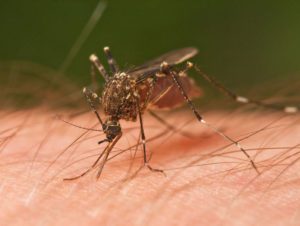 Adult mosquito control is by far the most well-known form of mosquito reduction and paradoxically for that reason also the most misunderstood. The fact remains that adult mosquito control is a key component of Integrated Mosquito Management and often the only viable control option available. Even the most thorough larviciding efforts will not eliminate all mosquitoes. Adult mosquitoes do not respect boundaries, and when the threat of mosquito-borne diseases exists, such as West Nile virus and Zika, there is a need for a robust approach to protecting public health warranting adult control measures.
Adult mosquito control is by far the most well-known form of mosquito reduction and paradoxically for that reason also the most misunderstood. The fact remains that adult mosquito control is a key component of Integrated Mosquito Management and often the only viable control option available. Even the most thorough larviciding efforts will not eliminate all mosquitoes. Adult mosquitoes do not respect boundaries, and when the threat of mosquito-borne diseases exists, such as West Nile virus and Zika, there is a need for a robust approach to protecting public health warranting adult control measures.
Present-day technologies such as GPS-based adulticiding (be it truck or aerial mounted) allow for effective applications the precision of which was all but unheard of even a few years ago. Real-time data collection via laptops and tablets allow the applicator to monitor factors such as speed, droplet size, flow rates, temperature and wind direction which can and do affect the success of the adulticide process. Such proactive mosquito management technology, utilized throughout VDCI, contributes to adulticide practices that minimize the impact on non-target organisms and maximizes the impact on mosquitoes. Reports can then be generated and used to help educate those in the public who are perhaps unaware of the data-driven methodology behind our actions and who may, therefore, harbor suspicions regarding the need for adulticiding.
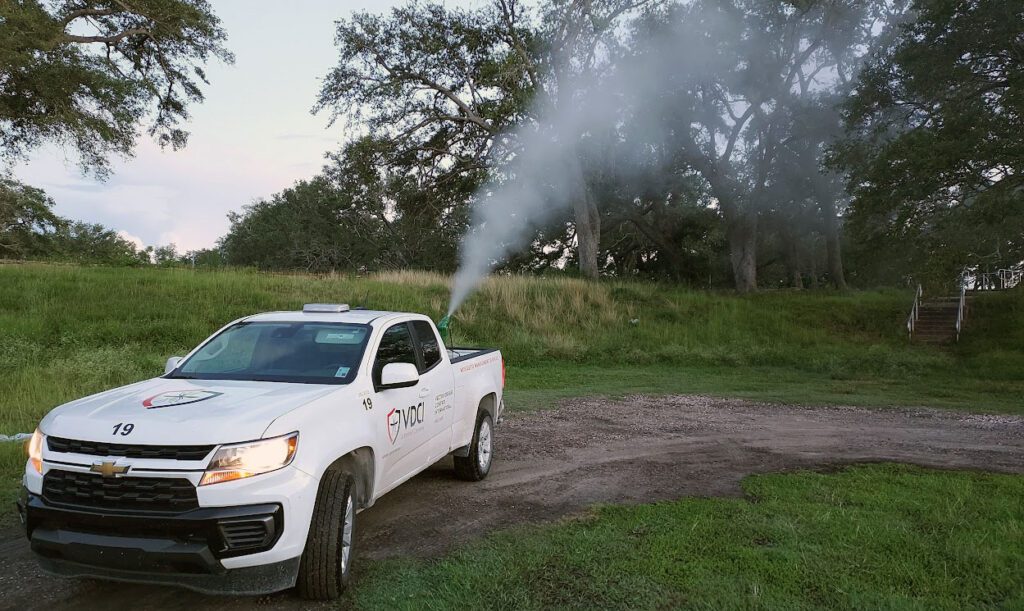
Without fully understanding the life cycle of a mosquito, a control program cannot claim to adhere to the principles of an IMM program responsibly. As in so many things, knowledge truly is power.
VDCI is committed to public education and spreading awareness throughout the U.S. about the dangers of mosquito-borne diseases and their preventability, with the overarching goal of reducing illness and fatality statistics. Our dedicated and experienced team works tirelessly to prevent the spread of vector-borne diseases in all of the contracts we service.
If you would like more information about any aspect of an Integrated Mosquito Management (IMM) program, including surveillance, disease testing, larval control or adult control, please contact Vector Disease Control International (VDCI) at 800.413.4445. We will help provide you with details to begin a meaningful program to protect public health in your community.
Contact Us to Learn More About Effective Mosquito Prevention Strategies:
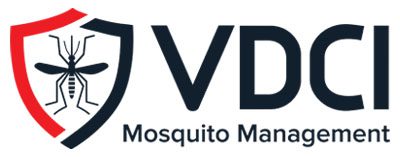 Since 1992, Vector Disease Control International (VDCI) has taken pride in providing municipalities, mosquito abatement districts, industrial sites, planned communities, homeowners associations, and golf courses with the tools they need to run effective mosquito control programs. We are determined to protect the public health of the communities in which we operate. Our mosquito control professionals have over 100 years of combined experience in the field of public health, specifically vector disease control. We strive to provide the most effective and scientifically sound mosquito surveillance and control programs possible based on an Integrated Mosquito Management approach recommended by the American Mosquito Control Association (AMCA) and Centers for Disease Control and Prevention (CDC). VDCI is the only company in the country that can manage all aspects of an integrated mosquito management program, from surveillance to disease testing to aerial application in emergency situations.
Since 1992, Vector Disease Control International (VDCI) has taken pride in providing municipalities, mosquito abatement districts, industrial sites, planned communities, homeowners associations, and golf courses with the tools they need to run effective mosquito control programs. We are determined to protect the public health of the communities in which we operate. Our mosquito control professionals have over 100 years of combined experience in the field of public health, specifically vector disease control. We strive to provide the most effective and scientifically sound mosquito surveillance and control programs possible based on an Integrated Mosquito Management approach recommended by the American Mosquito Control Association (AMCA) and Centers for Disease Control and Prevention (CDC). VDCI is the only company in the country that can manage all aspects of an integrated mosquito management program, from surveillance to disease testing to aerial application in emergency situations.

